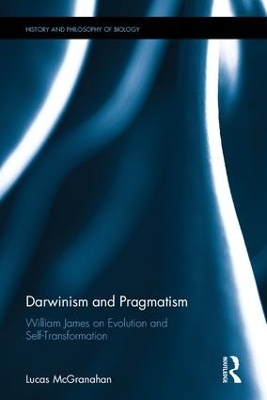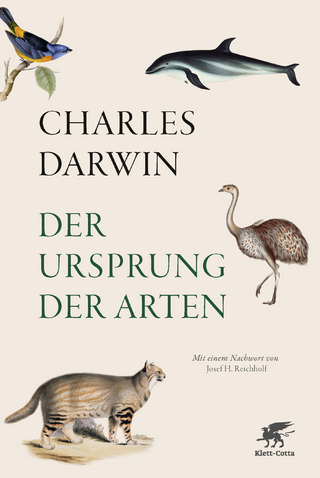
Darwinism and Pragmatism
William James on Evolution and Self-Transformation
Seiten
2017
Pickering & Chatto (Publishers) Ltd (Verlag)
978-1-84893-596-9 (ISBN)
Pickering & Chatto (Publishers) Ltd (Verlag)
978-1-84893-596-9 (ISBN)
Focusing on the work of William James (1842–1910), this study looks at Darwinian evolution within the context of a person-oriented philosophy. McGranahan argues for James as an innovator of evolutionary concepts and an early proponent of non-reductionist Darwinism.
Charles Darwin’s theory of natural selection challenges our very sense of belonging in the world. Unlike prior evolutionary theories, Darwinism construes species as mutable historical products of a blind process that serves no inherent purpose. It also represents a distinctly modern kind of fallible science that relies on statistical evidence and is not verifiable by simple laboratory experiments. What are human purpose and knowledge if humanity has no pre-given essence and science itself is our finite and fallible product?
According to the Received Image of Darwinism, Darwin’s theory signals the triumph of mechanism and reductionism in all science. On this view, the individual virtually disappears at the intersection of (internal) genes and (external) environment. In contrast, William James creatively employs Darwinian concepts to support his core conviction that both knowledge and reality are in the making, with individuals as active participants. In promoting this Pragmatic Image of Darwinism, McGranahan provides a novel reading of James as a philosopher of self-transformation. Like his contemporary Nietzsche, James is concerned first and foremost with the structure and dynamics of the finite purposive individual.
This timely volume is suitable for advanced undergraduate, postgraduate and postdoctoral researchers interested in the fields of history of philosophy, history and philosophy of science, history of psychology, American pragmatism and Darwinism.
Charles Darwin’s theory of natural selection challenges our very sense of belonging in the world. Unlike prior evolutionary theories, Darwinism construes species as mutable historical products of a blind process that serves no inherent purpose. It also represents a distinctly modern kind of fallible science that relies on statistical evidence and is not verifiable by simple laboratory experiments. What are human purpose and knowledge if humanity has no pre-given essence and science itself is our finite and fallible product?
According to the Received Image of Darwinism, Darwin’s theory signals the triumph of mechanism and reductionism in all science. On this view, the individual virtually disappears at the intersection of (internal) genes and (external) environment. In contrast, William James creatively employs Darwinian concepts to support his core conviction that both knowledge and reality are in the making, with individuals as active participants. In promoting this Pragmatic Image of Darwinism, McGranahan provides a novel reading of James as a philosopher of self-transformation. Like his contemporary Nietzsche, James is concerned first and foremost with the structure and dynamics of the finite purposive individual.
This timely volume is suitable for advanced undergraduate, postgraduate and postdoctoral researchers interested in the fields of history of philosophy, history and philosophy of science, history of psychology, American pragmatism and Darwinism.
Dr Lucas McGranahan is an independent scholar with research interests in American pragmatism, nineteenth-century philosophy and the history and philosophy of science.
Introduction: A Pragmatic Image of Darwinism Chapter 1. Individuals in Evolution: James’s Darwinian Psychology Chapter 2. Individuals in History: Social Evolution without Social Darwinism Chapter 3. Self-Transformation: Habit, Will and Selection Chapter 4. Character Ideals and Evolutionary Logics in James and Nietzsche Chapter 5. Higher-Order Individuals: Truth and Reality as Organic Systems Conclusion: Divided Selves and Dialectical Selves
| Reihe/Serie | History and Philosophy of Biology |
|---|---|
| Zusatzinfo | 1 Halftones, black and white; 1 Illustrations, black and white |
| Verlagsort | London |
| Sprache | englisch |
| Maße | 156 x 234 mm |
| Gewicht | 430 g |
| Themenwelt | Geisteswissenschaften ► Geschichte |
| Geisteswissenschaften ► Philosophie | |
| Naturwissenschaften ► Biologie ► Evolution | |
| Sozialwissenschaften ► Soziologie | |
| ISBN-10 | 1-84893-596-X / 184893596X |
| ISBN-13 | 978-1-84893-596-9 / 9781848935969 |
| Zustand | Neuware |
| Haben Sie eine Frage zum Produkt? |
Mehr entdecken
aus dem Bereich
aus dem Bereich
Komplette Neuübersetzung. Mit einem Nachwort von Josef H. Reichholf.
Buch | Hardcover (2018)
Klett-Cotta (Verlag)
48,00 €
Wie die Vernichtung der Arten unser Überleben bedroht - Der …
Buch | Softcover (2023)
Penguin (Verlag)
15,00 €


